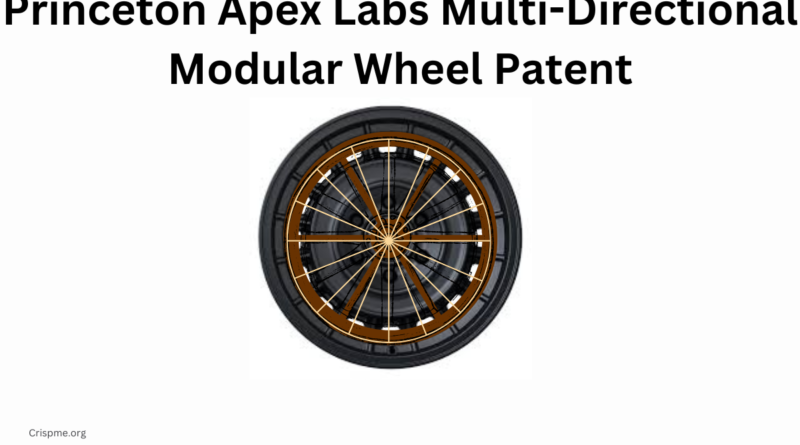The Princeton Apex Labs Multi-Directional Modular Wheel Patent: Revolutionizing Mobility and Automation
Introduction
A ground-breaking development in mobility and logistics, the Princeton Apex Labs Multi-Directional Modular Wheel Patent offers solutions that have the potential to completely transform a variety of industries, from manufacturing and military defense to robotics and automation. The device, which was created by Princeton researchers, offers improved mobility, efficiency, and versatility because to its integrated sensors, modular architecture, and autonomous movement capabilities. By combining automation, data integration, and interconnectivity to satisfy the demands of contemporary industries, this innovation adheres to the concepts of Industry 4.0.
Key Features of the Princeton Apex Labs Multi-Directional Modular Wheel Patent
The multidirectional modular wheel is the central component of the Princeton Apex Labs patent. These wheels provide unmatched agility since they can move in numerous directions at once, unlike ordinary wheels that can only move in a single direction. Among the wheel’s primary characteristics are:
Enhanced Maneuverability: Without the need for intricate steering systems, the multidirectional design allows for accurate control and seamless movement in any direction.
Independent Movement: Because each wheel may move independently, systems can quickly change orientation and direction. This is perfect for automated vehicles, mobile platforms, and robotics.
Integrated Sensors: The wheels’ sophisticated sensors ensure precise control and optimization by providing real-time information on speed, direction, and system performance.
Modular Design: The wheels may be readily modified due to their modular design, which makes them suitable for a wide range of applications in many sectors.
Cost Efficiency: The wheel system’s cost-effective design makes it a good option for a variety of sectors, including robotics and logistics.
Safety Enhancements: The wheels have features that increase safety, especially in settings where great precision and dependability are necessary.
Also Read: Investigating the Phone Number 0416 516 916: Scams, Consumer Alerts, and How to Stay Safe
Applications Across Various Industries
Princeton apex labs multi-directional modular wheel patent have a wide range of possible uses across numerous industries. Among the most promising fields are:
Logistics and Supply Chain Management: The wheels can greatly increase distribution centers’ and warehouses’ efficiency. Sorting, loading, and unloading processes are optimized by their multidirectional mobility, which enables more accurate and adaptable movement.
Automation and production: Wheels can be utilized in conveyor systems, AGVs (Automated Guided Vehicles), and mobile robots in production settings. They are perfect for intricate assembly and manufacturing lines because of their capacity to move through confined areas and around obstructions.
Robotics: The multidirectional wheels increase the movement of self-governing robots, allowing them to execute intricate tasks with increased dexterity and accuracy. They are particularly helpful in settings that call for multi-dimensional mobility, such drones, surveillance robots, and search-and-rescue operations.
Security and Surveillance: By incorporating the wheels into security robots, these machines can easily maneuver through intricate spaces like stadiums, airports, and huge public gathering places.
Military and Defense: For military robots employed in bomb disposal, logistics, or reconnaissance, where negotiating a variety of terrain and tight areas is essential, the capacity to move in numerous directions can be advantageous.
Alignment with Industry 4.0 and Emerging Technologies
The multidirectional modular wheel’s creation is in line with Industry 4.0’s tenets, which place a strong emphasis on incorporating cutting-edge technology into manufacturing and other fields. The design and operation of the wheel embody the three main components of Industry 4.0: automation, data integration, and interconnectivity. These wheels have Internet of Things (IoT) capabilities that enable them to interact with other systems, resulting in a smooth information flow that enhances coordination and efficiency.
Furthermore, using machine learning (ML) and artificial intelligence (AI) can improve these wheels’ performance even more. AI can facilitate autonomous decision-making, enabling the system to identify irregularities, optimize routes, and make adjustments in real time. Continuous optimization is made possible by machine learning algorithms that can evaluate data gathered from the wheels to enhance their performance over time.
The patent’s possible synergy with the idea of digital twins is another intriguing feature. Digital twins are virtual representations of physical systems that can be utilized for real-time device testing and monitoring. Without depending on actual prototypes, businesses can perform predictive maintenance, virtual testing, and performance monitoring by building digital copies of systems that use princeton apex labs multi-directional modular wheel patent.
Challenges and Considerations About Princeton Apex Labs Multi-Directional Modular Wheel Patent
Notwithstanding its enormous potential, the multidirectional modular wheel system has a number of issues that must be resolved before it can be widely used:
Design and Implementation: Due to the intricacy involved in creating and producing multidirectional wheels, knowledge of robotics, materials science, and sensor technology is necessary. Reliability requires that the wheels be able to sustain high-intensity impacts while yet having a long service life.
Maintenance and Durability: The wheels will require meticulous maintenance, just like any other cutting-edge technology. To extend the wheels’ lifespan, preventative maintenance techniques and real-time performance monitoring will be essential.
Cost considerations: Although the design is intended to be economical, smaller enterprises may still find the integration of sensors, actuators, and modularity to be a substantial investment. As a result, technology transfer and licensing are crucial for increasing acceptance.
Conclusion
A ground-breaking development that has the potential to revolutionize mobility in a variety of industries is the Princeton Apex Labs Multi-Directional Modular Wheel Patent. This technology offers a flexible and affordable way to improve robotics, automation, logistics, and more by fusing independent movement, improved maneuverability, integrated sensors, and adaptability. Princeton apex labs multi-directional modular wheel patent are positioned to revolutionize our understanding of movement and automation with the added advantages of conforming to Industry 4.0 principles and utilizing cutting-edge technology like artificial intelligence, the Internet of Things, and machine learning. However, design, implementation, and maintenance issues must be properly controlled if the entire potential is to be achieved.
Also Read: The Generic CDI Polini Thor 250 Engines: A Comprehensive Analysis
FAQs
What makes the Princeton Apex Labs Multi-Directional Modular Wheel different from traditional wheels?
The key difference lies in its ability to move in multiple directions simultaneously, offering superior maneuverability compared to traditional wheels that are limited to forward and backward movement. This is achieved through a modular design and independent movement of each wheel.
What industries can benefit from this technology?
Princeton apex labs multi-directional modular wheel patent has applications across various industries, including logistics, manufacturing, robotics, security, surveillance, and military defense. It is especially useful in environments that require precise movement in tight spaces or complex terrains.
How does the technology integrate with Industry 4.0?
Princeton apex labs multi-directional modular wheel patent are designed to integrate seamlessly with Industry 4.0 technologies such as automation, IoT, and data integration. This enables real-time communication between the wheels and other systems, improving operational efficiency and enabling predictive maintenance.
Can these wheels be used in robots?
Yes, Princeton apex labs multi-directional modular wheel patent are ideal for robotics, providing robots with enhanced agility and the ability to navigate complex environments. They can be used in mobile robots for tasks such as delivery, surveillance, and search-and-rescue operations.
What are the challenges associated with the technology?
Challenges include the complexity of the design and manufacturing process, the need for effective maintenance strategies, and ensuring the cost-effectiveness of the system, Princeton apex labs multi-directional modular wheel patent. Additionally, proper implementation and real-time monitoring are necessary to maximize performance and longevity.
Will these wheels require significant maintenance?
The wheels are designed for durability, but like all advanced technologies, they will require regular maintenance, Princeton apex labs multi-directional modular wheel patent. Integrating real-time data from sensors and predictive maintenance algorithms will help reduce downtime and extend the wheels’ life cycle.
How can businesses access this technology?
Businesses can explore licensing opportunities through the Princeton discoveries database and technology transfer programs, which allow them to integrate the princeton apex labs multi-directional modular wheel patent into their operations.




